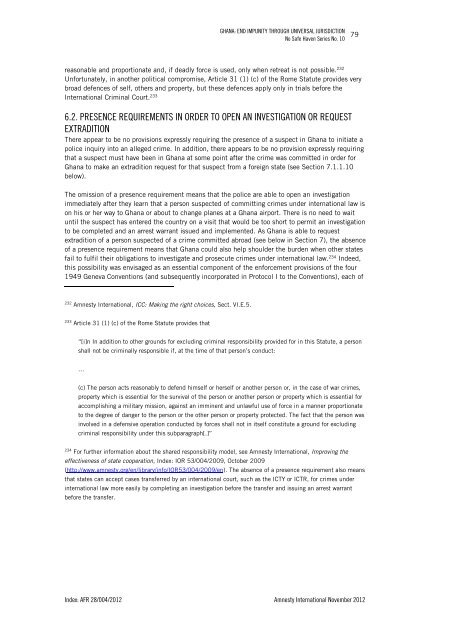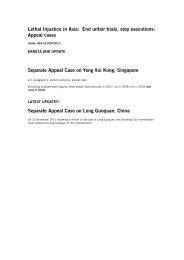78GHANA: END IMPUNITY THROUGH UNIVERSAL JURISDICTIONNo Safe Haven Series No. 10Necessity. <strong>Ghana</strong>ian law does not expressly provide for the defence of necessity, although it ispossible that this defence may exist based on the English common law as it existed in 1957 at thetime of independence. 226Defences – defence of person or property. The defence in <strong>Ghana</strong>ian law of self-defence, or defenceof person, is consistent with the strictest requirements of international law and what is appropriatefor crimes under international law. The <strong>Ghana</strong> Criminal Code provides, and jurisprudence holds, thatdefence of a person is a defence to crime in circumstances of extreme necessity. The accused mustshow that an attack was in progress placing him or herself, or another person, at risk of imminentdanger. 227 The accused must also show that there was no other means of defending the person atrisk of harm and that the force used to defend the attack was reasonable and proportionate. 228Deadly force is justified based on these requirements if safe retreat is not possible. 229Similarly, a property owner or other authorized person may exercise force to defend propertyrights. 230 However, deadly force in defence of property is not justified, but it may be used in certaincircumstances to defend persons on property. 231As <strong>Amnesty</strong> <strong>International</strong> has explained, self-defence and defence of others can be defences tocrimes under international law in certain limited circumstances, but only when the response is226Henrietta Mensa-Bonsu, The General Part of the Criminal Law – A <strong>Ghana</strong>ian Casebook 253 – 261 (2001).227See Henrietta Mensa-Bonsu, The General Part of the Criminal Law – A <strong>Ghana</strong>ian Casebook 204 – 230(2001); State v. Ampomah, GLR 262, SC (1960) (quashing the conviction of a defendant who fought off anattack by a group of men, killing one); Nartey v. The Republic, GLR 788, CA (1982-83) (discharging a man who,while farming, fought off an attack and killed his attacker). Section 37 of the Criminal Code states:“For the prevention of, or for the defence of himself or any other person against a criminal offence, or forthe suppression or dispersion of a riotous or an unlawful assembly, a person may justify the use of force orharm which is reasonably necessary extending in case of extreme necessity, even to killing.”228See Republic v. Zinitege, 1 GLR 1 (1993-94) (upholding the conviction of a defendant whose fatal blow wasunreasonable in the circumstances). Regarding reasonableness, the question at issue is the amount and kind offorce used, not the type of weapon used. Bodua alias Kwata v. The State, GLR 51 (1966).229See Lamptey alias Morocco v. The Republic, 1 GLR 165, (1974) (stating “[W]here there is a safe opportunityfor retreat killing cannot be justified“); Torto v.The Republic, 1GLR 342 (1971) (holding that returning tocontinue fighting after retreat falls outside the scope of self-defence).230See Henrietta Mensa-Bonsu, The General Part of the Criminal Law – A <strong>Ghana</strong>ian Casebook 230-33 (2001);Abeka & Anor v. The Republic, GLR 438 (1980) (stating “an accused is entitled to raise as a defence the use ofreasonable force in defence of a landed property of which a claim is made in good faith”). Defence of propertyincludes: repelling an intruder who attempts to forcibly and unlawfully enter property, removing a person whorefuses to depart in violation of the law, recovering possession of goods unlawfully held, or overcoming anobstruction or resistance to the exercise of a legal property right. Criminal Code, sect. 39.231See Henrietta Mensa-Bonsu, The General Part of the Criminal Law – A <strong>Ghana</strong>ian Casebook 231 (2001);however, deadly force may be used to defend persons on disputed property. See Awaitey and another v. TheRepublic, GLR 179 (1978) (stating that the law on self-defence applies in a case where a group of armedassailants attacked a father and son on their farm).<strong>Amnesty</strong> <strong>International</strong> November 2012 Index: AFR 28/004/2012
GHANA: END IMPUNITY THROUGH UNIVERSAL JURISDICTIONNo Safe Haven Series No. 1079reasonable and proportionate and, if deadly force is used, only when retreat is not possible. 232Unfortunately, in another political compromise, Article 31 (1) (c) of the Rome Statute provides verybroad defences of self, others and property, but these defences apply only in trials before the<strong>International</strong> Criminal Court. 2336.2. PRESENCE REQUIREMENTS IN ORDER TO OPEN AN INVESTIGATION OR REQUESTEXTRADITIONThere appear to be no provisions expressly requiring the presence of a suspect in <strong>Ghana</strong> to initiate apolice inquiry into an alleged crime. In addition, there appears to be no provision expressly requiringthat a suspect must have been in <strong>Ghana</strong> at some point after the crime was committed in order for<strong>Ghana</strong> to make an extradition request for that suspect from a foreign state (see Section 7.1.1.10below).The omission of a presence requirement means that the police are able to open an investigationimmediately after they learn that a person suspected of committing crimes under international law ison his or her way to <strong>Ghana</strong> or about to change planes at a <strong>Ghana</strong> airport. There is no need to waituntil the suspect has entered the country on a visit that would be too short to permit an investigationto be completed and an arrest warrant issued and implemented. As <strong>Ghana</strong> is able to requestextradition of a person suspected of a crime committed abroad (see below in Section 7), the absenceof a presence requirement means that <strong>Ghana</strong> could also help shoulder the burden when other statesfail to fulfil their obligations to investigate and prosecute crimes under international law. 234 Indeed,this possibility was envisaged as an essential component of the enforcement provisions of the four1949 Geneva Conventions (and subsequently incorporated in Protocol I to the Conventions), each of232<strong>Amnesty</strong> <strong>International</strong>, ICC: Making the right choices, Sect. VI.E.5.233Article 31 (1) (c) of the Rome Statute provides that“[i]n In addition to other grounds for excluding criminal responsibility provided for in this Statute, a personshall not be criminally responsible if, at the time of that person’s conduct:…(c) The person acts reasonably to defend himself or herself or another person or, in the case of war crimes,property which is essential for the survival of the person or another person or property which is essential foraccomplishing a military mission, against an imminent and unlawful use of force in a manner proportionateto the degree of danger to the person or the other person or property protected. The fact that the person wasinvolved in a defensive operation conducted by forces shall not in itself constitute a ground for excludingcriminal responsibility under this subparagraph[.]”234For further information about the shared responsibility model, see <strong>Amnesty</strong> <strong>International</strong>, Improving theeffectiveness of state cooperation, Index: IOR 53/004/2009, October 2009(http://www.amnesty.org/en/library/info/IOR53/004/2009/en). The absence of a presence requirement also meansthat states can accept cases transferred by an international court, such as the ICTY or ICTR, for crimes underinternational law more easily by completing an investigation before the transfer and issuing an arrest warrantbefore the transfer.Index: AFR 28/004/2012 <strong>Amnesty</strong> <strong>International</strong> November 2012
















